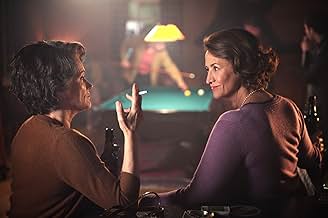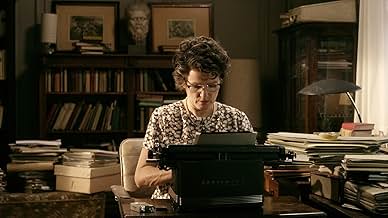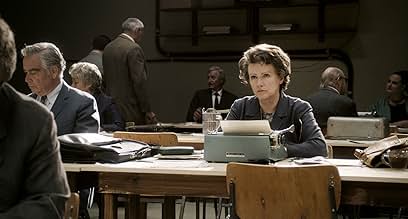Barbara Sukowa credited as playing...
Hannah Arendt
- Hannah Arendt: You describe a book I never wrote.
- Siegfried Moses: A book that will never be allowed in Israel. And won't appear anywhere else either if you have any decency left.
- Hannah Arendt: You ban books, and lecture me about decency!
- Hannah Arendt: Western tradition mistakenly assumes that the greatest evils of mankind arise from selfishness. But in our century, evil has proven to be more radical than was previously thought. And we now know that the truest evil, the radical evil, has nothing to do with selfishness or any such understandable, sinful motives. Instead, it is based on the following phenomenon: making human beings superfluous as human beings. The entire concentration camp system was designed to convince the prisoners they were unnecessary before they were murdered. In the concentration camps men were taught that punishment was not connected to a crime, that exploitation wouldn't profit anyone, and that work produced no results. The camp is a place where every activity and human impulse is senseless. Where, in other words, senselessness is daily produced anew. So to summarize: If it is true that in the final stage of totalitarianism, an absolute evil emerges, absolute as it no longer relates to human motives, then it is equally true that without it, without totalitarianism, we would never have known the truly radical nature of evil.
- Hannah Arendt: How can you leave me like that? No hug, no kiss?
- Heinrich Blücher: Never disturb a great philosopher when they're thinking.
- Hannah Arendt: But they can't think without kisses.
- [last lines]
- Hannah Arendt: Everyone is trying to prove me wrong. But no one noticed my one real mistake. Evil cannot be both banal and radical at once. Evil is only ever extreme. It's never radical. Only good can be profound and radical.
- Heinrich Blücher: Would you have written about the trial if you'd known what would happen?
- Hannah Arendt: Yes. I would have written about it. Maybe I had to find out who my real friends were.
- Heinrich Blücher: Kurt was your friend. He still would be.
- Hannah Arendt: Kurt was my family.
- Hannah Arendt: I wrote no defense of Eichmann, but I did try to reconcile the shocking mediocrity of the man with his staggering deeds. Trying to understand him is not the same thing as forgiveness. And furthermore, I see it as my responsibility to understand. It is the responsibility of anyone who dares to put pen to paper on this subject.
- Hannah Arendt: He swears he never personally harmed a Jew.
- Kurt Blumenfeld: So he claims!
- Hannah Arendt: Isn't it interesting that a man who did everything a murderous system asked of him, who even seems eager to give precise details of his fine work, that this man insists the personally has nothing against Jews.
- Hannah Arendt: He transported people to their deaths, but didn't feel responsible for it. Once the trains were in motion his work was done.
- Kurt Blumenfeld: So he can say he's free of guilt despite what happened to the people he transported?
- Hannah Arendt: Yes! That's how he see's it. He's a bureaucrat!
- Hannah Arendt: But Kurt, you can't deny the huge difference between the unspeakable horror of the deeds and the mediocrity of the man.
- Hannah Arendt: I am, as you know, a Jew, and I have been attacked as a self-hating Jew who defends Nazis and scorns her own people. This is not an argument. That is a character-assassination.
- [first lines]
- Mary McCarthy: But Hannah, how can you defend him?
- Hannah Arendt: But I'm not defending him. You can hardly forget that your husband is only my friend because of you. And I don't throw away my friends so quickly.
- Lotte Köhler: The Pope would never help a Nazi escape.
- Hannah Arendt: No, he helped him because he was such a good Catholic.
- Mary McCarthy: Every time I even write a sex scene, I have you horribly on my conscious - as if you're talking to my elbow saying: stop!
- Hannah Arendt: I have no problem with sex.
- Mary McCarthy: I'm afraid you'll think I'm an exhibitionist or something.
- Hannah Arendt: Well, you are.
- Hannah Arendt: I had the opportunity to spend some time in a French detention camp called Gurs.
- Female Student: But, weren't the French on your side?
- Hannah Arendt: In the beginning. They took us in. But when the Germans invaded France on May 10, 1940, our French friends put us into detention camps. We became a new kind of human being, put into concentration camps by our enemies and into detention camps by our friends.
- Hannah Arendt: Since Socrates and Plato, we usually call thinking to be engaged in that silent dialogue between me and myself. In refusing to be a person, Eichmann utterly surrendered that single most defining human quality. That of being able to *think*. Consequently, he was no longer capable of making moral judgments. This inability to think created the possibility for many ordinary men to commit evil deeds on a gigantic scale - the like of which one had never seen before. It is true I have considered these questions in a philosophical way. The manifestation of the "wind of thought" is not knowledge, but the ability to tell right from wrong, beautiful from ugly. And I hope that thinking gives people the strength to prevent catastrophes in these rare moments when the chips are down.
- Mary McCarthy: [interrupting a German discussion] Whatever you are saying, I agree with all of you.
- Hannah Arendt: Everybody, English now, please.
- Hannah Arendt: Nixon calculates. But, Kennedy is young and handsome and inspiring. And that's what matters when the ships are down.
- Mary McCarthy: Chips, Hannah. Chips. It's not ships.
- Kurt Blumenfeld: And how's my Heinrich? Is he good to you?
- Hannah Arendt: Yes. Sometimes too good.
- Kurt Blumenfeld: I miss arguing with him. I can no longer see my way through the maze of modern life.





